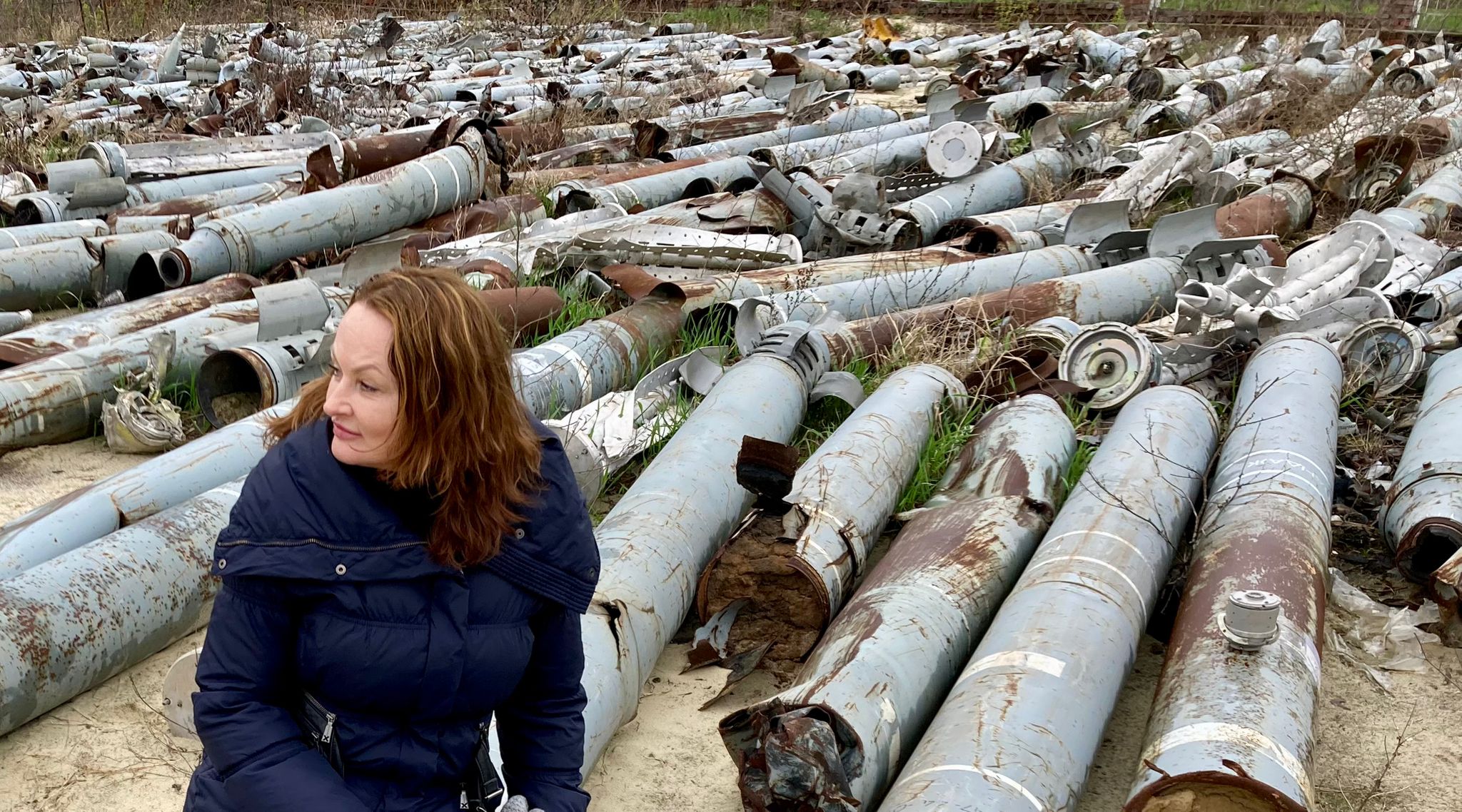
Yulia Valova, a journalist from Ukraine.

Yulia Valova, a journalist from Ukraine.
Afghan journalist Shukrullah Esmat was forced to pack his things in a couple of suitcases and leave his own country in August 2021. Before then, he had some experience as a scriptwriter and filmmaker, and worked at Radio Killid, a local media outlet. Esmat lived with his wife and his two small children. Three years later, amid the freezing German winter, he believes his life was perfect back then.
When the Taliban returned to power, dozens of journalists had to flee Afghanistan for fear of reprisals. Reporters Without Borders (RSF) helped a 29-year-old Esmat leave his country for Pakistan, where they arranged accommodation for him and his family until they got humanitarian visas to reach Germany.
Once in Germany, they first lived in a refugee camp. But the government soon gave them a monthly allowance and now they live in their rented flat. “It is not a lot of money, but it’s enough for me and my family to rebuild a life here,” he says. Sadly, films and journalism, his great passions, have had to be put aside.
Esmat’s story will sound familiar to journalists from many countries who are increasingly forced to go into exile to avoid persecution for their work. According to RSF, at least 460 journalists from 62 countries received financial assistance to leave their countries in 2023, almost twice as many as in 2022, when there were 223 requests.
This phenomenon has been on the rise for several reasons: the full-scale invasion of Ukraine, the rise of authoritarianism in many countries, and the increased power of organised crime.
“Over 70% of the world population live under authoritarian regimes. Most of the time, the first thing these regimes do is suppress freedom of the press,” says Penelope Winterhager, Managing Director of the European Fund for Journalism in Exile, also known as JX Fund.
I spoke with four journalists from Afghanistan, Guatemala, Nicaragua and Ukraine, as well as with representatives of three organisations that support journalism in exile. My goal was to learn more about the challenges they face once they leave their home countries. Based on their responses, I’ve structured this piece in four key themes.
Juan Luis Font is a 56-year-old Guatemalan journalist with 33 years of experience. He was a founding member of the newspaper elPeriódico and currently has a talk show called Con Criterio, which is broadcast from exile every day as a radio programme and every Sunday as a live-stream.
In 2022, Font had to leave Guatemala due to judicial persecution. Former minister Alejandro Sinibaldi filed a criminal complaint against him for which he would be sentenced to eight years in prison. “Everyone said I should leave,” he says. So he left and lived for a while in France and the United States.
No document confirms that Font is an exiled journalist, but that does not mean he is not. “It’s these conditions that lead you to leave your country and transform you into an exile journalist, not your immigration status,” explains Cinthia Membreño, a 35-year-old Nicaraguan journalist and the coordinator of the Network of Exiled Media Outlets (NEMO), a group made up of five outlets operating from exile.
“Exile is a very traumatic episode. It takes time to make peace with it. It does not happen overnight. That’s why people leave in different ways,” says Membreño, who used to work as Audience Loyalty Manager at Confidencial, an influential news site that has gone into exile twice following persecution by Daniel Ortega’s regime.
Many journalists prefer not to change their migration status when they arrive in a new country. Some find it difficult to accept their new reality. Others even believe it will be a short stay. Many want to avoid an exhausting amount of paperwork.
Some of these journalists need to come back to their home countries. “I had to do it because my mother was very ill with cancer,” Font says. “I spent three months hiding, doing my radio show with a VPN and pretending I was in the United States. At night, I took turns with my siblings to care for her.”
Font didn’t want to leave, but his family urged him to do so as soon as possible. He said goodbye to his mother, his children drove him to the border, and from El Salvador took a plane to the United States, where he entered as a tourist again.
Font is aware that his migratory status keeps him from receiving help from organisations, in addition to living with the worry of where to go once the tourist visa runs out.

Support organisations such as the JX Fund and Körber Stiftung suggest that the decision to go into exile is even tougher in countries without an outright dictatorship but where democracy and press freedom are under threat. This leads to what journalists see as temporary relocations, sometimes with the help of scholarships and often with the support of relatives or friends.
This step is often tough for many journalists. Some didn’t even choose the country where they are staying as they are relying on the generosity of support organisations.
According to the report Exile Journalism in Europe by German-based organisation Körber Stiftung, journalists who manage to escape often seek protection in democracies where they can work from exile. But most of them face many obstacles.
Ukrainian journalist Yulia Valova had to leave Ukraine a few months after Russia launched the full-scale invasion of her country in February 2022. At that time, she was covering judicial affairs for Intelligent, a magazine founded a few months before.
“As time passed, we realised that the attacks were getting stronger and closer to the capital. Most of my team decided to go to defend Ukraine, so we stopped the project,” Valova says. Almost all of her team went to the frontlines, so there was no choice. “It didn’t make any sense to stay because it was dangerous.”
Valova moved to Germany, where she knew colleagues and friends who could help her. She stayed with them for a while. But as the war raged on, she applied for a humanitarian visa. “I just arrived with my suitcase and my notebook and I began looking for a job, but the problem was that I didn’t speak German,” she says.
Valova sent her CV to dozens of media outlets and she only got one response from Tagesspiegel, a Berlin-based newspaper. They launched an open call to hire five Ukrainian journalists who could speak English. “I got one of those jobs and that helped me a lot,” she says. “No other outlet has done something like that. They all ask for German speakers.” Unfortunately, this contract ended and she now works there only occasionally and for less money.
Language is one of the most significant barriers for journalists in exile. Many arrive in countries with a different language and can’t apply for any newsroom vacancies until they have at least a C1 level. This means they stop working and lose their sources. “Unfortunately, being in exile means that you are forgotten,” adds Esmad, who is experiencing this problem in Germany.
Hamid Obaidi, Founder of the Afghanistan Journalists Support Organization (AJSO), says this is why so many Afghans have given up the profession. “Young journalists say they no longer like to be a journalist and it’s understandable. In Europe, they have found new opportunities, easy to get. Some are therefore going into academia, pursuing doctorates or master’s degrees in English and other areas such as marketing.”
Journalists with up to 20 years of experience are the most affected when looking for other options as rebuilding their lives is more difficult emotionally and professionally at their age. According to AJSO, the situation is even worse outside Europe, where they do not find support from long-term exile programmes.
“We know people who arrived there without speaking any English,” Obaidi says. “After six months, they have to pay their bills and they are forced to take another job in a supermarket. They can’t come back to journalism. They have to survive.”
All the journalists I spoke to have suffered from mental health problems. “Leaving your country against your will is the worst thing that can happen to you,” says Membreño, the journalist from Nicaragua. “It’s such a sad and distressing situation as you don’t know what will happen, and it’s tough to say goodbye to your family, friends, weather, traditions.”
Anxiety is a constant companion. “I’ve had so many times when I wake up at 3:00 in the morning and say: ‘Now how am I going to pay for the next month? Where am I going when my tourist visa runs out?’” says Font, the journalist from Guatemala, who was forced to grieve for his mum from afar. “The saddest day of my exile was when my mother died. I could only return to Guatemala for one day to be present at her wake.”
Every time journalists are threatened for their work, they fear for their relatives. As Afghanistan's Ministry of Culture has the record of Esmat’s films, for example, he’s terrified this could have any impact on his loved ones back home. “I’m fearing that one day the Taliban could come into my home and arrest my family,” he says.

Valova is concerned about the safety of her mother, who’s still in Ukraine. “It’s hard to call her any time I hear about air strikes,” she says. “I’ve told her to travel to Germany, but, like so many old people, she wants to stay in Ukraine.”
Exiled journalists are only partially safe in their host countries. JX Fund’s Winterhager says the dangers can be transnational for journalists and their families: “People are harassed digitally and spy agencies often operate in the countries where they are exiled.”
Uncertainty, sadness and anxiety can lead to mental health problems, physical pain, and irritability. So journalists often need professional help they don’t have access to. “Throughout the first few months, I was in shock and depressed,” Esmat says. “There was nobody to talk about it. I listened to an RSF Zoom call on mental health, which was helpful but not enough.”
Journalists in exile often live in isolation and do not meet other reporters from their own countries. “Ours is a fragmented community,” says Membreño. This makes exile much more difficult and makes those affected feel even more alone.
Collaboration and structural support are key for these journalists, who would need funding but also networks and training. JX Fund’s Winterhager thinks it takes at least two years just to start projects to address these needs, the first one to design the concept and structure and the second one to get it off the ground.
As more journalists go into exile, new networks such as AJSO, NEMO, and JX Fund have emerged. These organisations seek to support journalists who want to continue their work.
“We founded the network and started producing a podcast where we shared common experiences. We want to share everything we know so that other media in exile can be more resilient,” says Membreño, who leads NEMO, which is now made up of five outlets: El Confidencial from Nicaragua, Meydan TV from Azerbaijan, Zamaneh Media from Iran, Medusa from Russia and Democratic Voice of Burma from Myanmar.

Representatives of these media outlets have joined forces to raise awareness of journalism in exile and the importance of this type of journalism.
AJSO and JX Fund are focused on different regions. AJSO was born out of concern for the critical situation facing Afghan journalists abroad and is now creating a database to identify how many Afghan journalists are in exile and what their conditions are.
JX Fund is supporting journalists in exile from Russia and Belarus, but they help journalists and news outlets from other 25 nationalities too. Since its launch in April 2022, JX Fund has helped 55 news outlets get back on their feet and report from exile. The organisation says up to 1,600 journalists have been able to resume their work with their support.
How can news organisations operating from exile keep being relevant to their audiences? “They must continue to work on subjects that are still important within their home countries,” Winterhager says. “If we lose these outlets, we will not have trustworthy information from those countries, and this is happening. We see that in Russia, Afghanistan and Belarus”.
The people I interviewed think democratic governments should help these journalists find safe places and immediate assistance. “Just helping us with visa approvals is a big step,” Winterhager says. “But governments can also give funding to media outlets in exile [in a way in which] it doesn’t directly influence the output.”
When a big crisis happens, everyone is happy to help, Membreño says. But over time, authoritarianism becomes normalised and it’s much more difficult for journalists to get any help. That’s why she thinks we need a different mindset, both in nonprofits and amongst audiences, so any support is more permanent and robust.
At every email we send you'll find original reporting, evidence-based insights, online seminars and readings curated from 100s sources - all in 5 minutes.